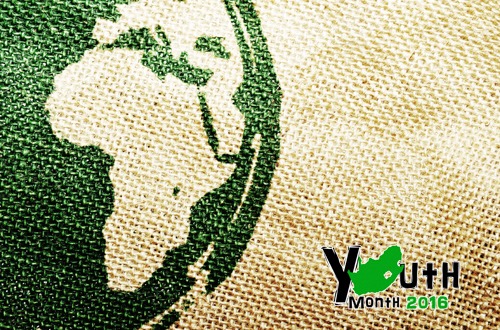
This article forms part of the Youth Month 2016 series in which SME South Africa, throughout the month of June, will shine the spotlight on youth issues and highlight the work of young entrepreneurs and innovators who are shaping SA’s future.
In 2015 80 young Africans from over 30 African countries from the Global Shapers Community were brought together to discuss issues relating to Africa’s economy with the continent’s well known billionaires, government ministers and state presidents at the World Economic Forum held in Cape Town.
This group of 80 young Africans made a decision to go beyond just talk and got together to form what they dubbed the Africa80 – a Pan African foundation that works to foster and promote collaboration among young Africans.
This year the group released their book, Africa80: Transformation Through Collaboration, a result of their collaboration and was largely organised using every resource they could muster, including Whatsapp, says Cindy Pearl Maphumulo, a South African entrepreneur, writer and speaker who co-founded the organisation together with Alvin Nyika from Zimbabwe.
Global Shapers
The book’s foreword is by Ashish Thakkar, an African entrepreneur who founded Mara Group and Mara Foundation and who, at 34, is known as Africa’s youngest billionaire.
The format of the book is a collection of essays from each of the Africa80 with topics ranging from green opportunities in Africa, and a discussion of what is needed to meet the continent’s food challenges to the need for youth-led innovation in business and entrepreneurship as the path to young people’s economic empowerment.
“My involvement with Africa80 stems from wanting to be part of something greater and bigger than myself. Reading through my peers’ stories in the Africa80 book, I am humbled, challenged and inspired all at the same time to do more and to give more to my community. Such a group is something I want to be surrounded with so that I can always aim higher,” says Lillian Madeje an entrepreneur from Tanzania whose contribution in the book is about redefining how business is done in Tanzania.
“Hopefully, it [the book] will encourage other young Africans to share their stories so that Africans start being the authors of their own continent”
SME South Africa spoke to 5 of the book’s contributors on the part they are playing in solving the continent’s challenges and the message they want to share with the continent’s young people.
Lillian Secelela Madeje, Tanzania
Entrepreneur and co-founder of Ekihya Consulting and Bits and Bytes Annual Tech Conference
Africa80 contribution: ‘Changing the way business is done in Tanzania’
“With an estimated 2.75 million Small and Medium Enterprise owners owning and managing 3.16 million SMEs in Tanzania and the sector being estimated with contributing about 27% (6.9 TZs Trillion) to the GDP of the country, it is clear to see that Small and Medium Enterprises play a critical role in Tanzania’s economy.
“These numbers are just a tip of the iceberg as there is great evidence that a great number of SMEs are currently operating informally and thus could actually account for an even greater economic impact within Tanzania when captured.”
What do you believe are the biggest challenges facing young Africans?
Unemployment, security, lack of quality education, government bureaucracy and [a need for] mind set transformation.
What do you believe young people need to solve these challenges?
The beauty of being young is that we are forever resourceful, youth of today are defying odds and doing all that they can in their capacity to make something out of themselves.
Why do you think it is important that young Africans get involved in challenges affecting the continent?
This is our continent and we are the NOW generation not even the future generation and thus we need to get things in order for us to survive and thrive in Mama Afrika.
”The most dramatic changes in any country usually come from the youth because young people have the energy and desire to evoke change” – Mlamuli Mbambo
Nabil Hamdaoui, Morocco
Cultural player and office manager at Emerging Business Factory, an incubator
Africa80 contribution: ‘Expertise vs Social Skills’
“Opportunity is 50% of any successful venture and it lurks around every corner, you just have to be at the right place, at the right time with the right people.”
Where does your interest in campaigning for youth come from?
My campaigning for the youth comes from the deep belief of ‘What would’ve happened if I knew then what I know now’. Feeling privileged to be able to hold a particular canal of communication with the youth through working with festivals, events and organizations, it is a duty to utilize it to the fullest of its potential in order to vehicle the right message and ideas.
What do you believe are the biggest challenges facing young Africans?
The biggest challenges are the access to education as well as the sense of identity as a continent. The true strength of the continent is the proportion of youth in its population, however if the youth do not get the right education coupled with the strong sense of belonging to a greater entity which is Africa – the continent will never fully benefit from the assets that such a youth bulge represents.
What do you believe young people need to solve these challenges?
Education and empowerment are key.
Hlengiwe Zondo, South Africa
CEO at African Reflections Group
Africa80 contribution topic: ‘Intra-Africa trade’
“Africa has not begun tapping into even a fraction of its true economic power and potential. We are living on the periphery of our greatness. Our tapestry is far greater.
“With the reality of statistics, intra-Africa trade sits just under 12% of total African trade with the world, we are hit with the realisation that we are looking past each other. Not seeing or exploring the value we each possess.”
Where does your interest in campaigning for youth come from and why did you get involved in the Africa80 initiative?
The reason I got involved in the Africa80 initiative is because I believed in the vision – to #TransformAfrica – break down borders, create a resilient, innovative and United Africa. There is no better time to build links of trade and collaboration in Africa, than now.
I have also been fortunate enough to have been mentored by amazing individuals like Monalisa Sam – who have taken the time to mine and refine the diamond within me – so it’s my duty to pay it forward.
Why do you think it is important that young Africans get involved in challenges affecting the continent?
It’s imperative that we all lend a hand – simply because – together we can do more.
“I hope [the book] will change the typical negative narrative about Africa”
Cindy Pearl Maphumulo, South Africa
Entrepreneur, writer and speaker
Africa80 contribution topic: (Re)branding Africa
“(Re)branding of the continent will not only encourage many of us here to begin engaging in intra-Africa trade because our perspective of the continent has changed, but also enhance intra-Africa investment.
“Yes, it is not a walk in the park; in fact, much sacrifice is required from this generation in reaching this goal of restoring Mother Africa to her promises of abundance, wealth and diversity.”
Why did you get involved in the Africa80 initiative?
I was there from the beginning when Africa80 was just a wish and formed part of the core organizing team. I did this because I not only believed in the empowerment of youth who are the majority of this continent in terms of population but also, I believe very much in the power of working together and so for me, the Africa80 was more than just a book, but a symbol of unity and the boundless achievements that can be seen through collaborative efforts.
What do you believe young people need to solve the challenges they face on the continent?
I believe that as young people, we need to be deliberate in trying to solve this. By this I mean, go out of your way beyond what you’ve been taught at school and research other economies, associate yourself with young foreign nationals and use the very same vehicles, such as social media to reach a better understanding. Would you believe me if I told you that the main vehicle used in the creation of the Africa80 book was Whatsapp?
Nothing beats action and we cannot wait and say the government needs to provide this or that in order for me to evolve, I’m not excusing the responsibility of the public sector but how long will you wait?
What do you hope young people from your country will gain from reading the book?
The articles in the book are a great source of information, but I really hope that above all, young people see the beauty and power of collaboration and how this can be used to accomplish almost anything for the betterment of our land. I hope that this inspires many other collaborative efforts amongst my peers.
“It’s imperative that we all lend a hand – simply because – together we can do more” – Hlengiwe Zondo
Mlamuli Mbambo, South Africa
Entrepreneur and financial literacy and entrepreneurship trainer
Africa80 contribution: Financial Literacy
“Africa’s [has a high number of] young people. We can choose to prepare this youth for money management or we let them make the same mistakes and try to repair them later. If we can empower the youth with financial acumen, we enable them to make decisions that will lead to financially secure lives.”
Where does your interest in campaigning for youth issues come from?
My interest in campaigning for financial literacy comes from my work experience and what I studied. I studied Bcom Economics and Finance and worked in one of the major banks in their credit and rehabilitation departments. I also worked in one of the major insurance companies. Both these experiences showed me that people and especially young people are not taught how to manage their money so they get into financial dire straits.
What do you believe are the biggest challenges facing young Africans?
I believe the biggest challenge facing young Africans is attaining economic emancipation. The previous generation fought for and achieved political emancipation but as the current youth of Africa our challenge is to fight for and achieve economic emancipation.
Why do you think it is important that young Africans get involved in challenges affecting the continent?
The most dramatic changes in any country usually come from the youth because young people have the energy and desire to evoke change.
What do you hope young people from your country will gain from reading the book?
I hope this book will encourage and inspire young people. I hope it will change the typical negative narrative about Africa and show them that this is a continent filled with opportunities and possibilities to create an amazing life for all its inhabitants. Hopefully, it will encourage other young Africans to share their stories so that Africans start being the authors of their own continent.
Kariba Moko, Kenya
Partner at Moad Capital
Africa80 contribution: ’10 Commandments of Seed Capital’
“No matter the size, every business is valid. So get your contracts and business proposals sound. Most startups walk to the negotiating table with dreams and aspirations and leave with bad deals not because they are incapable of better but because their understanding of the business value on the table is misinformed.”
Where does your interest in campaigning for youth come from and why did you get involved in the Africa80 initiative?
I accidentally got into business at 20 years of age and over the last 13 years I’ve grown because clients, mentors, communities like Global Shapers dared me to be more. My participation is a way of giving back. Hopefully from some of my mistakes a budding entrepreneur can have a smoother and faster growth curve from my trial and error.
What do you believe are the biggest challenges facing young Africans?
For a long time I would have quickly blurted out capital, access to markets and perception. But from a macro view I’ve realized common challenges/opportunities across the continent.
– Circular economy approach – entrepreneurship is changing the mindset of the millennial towards self empowerment. However the ecosystem must grow else we’ll have entrepreneurs who’ve are creating solutions but the market is small or inefficient to have gainful traction.
– Digital Economy – as the world automates and technology enables ease of communication, trade and lifestyle. The next challenge will become evolving the job market towards the eventual marketplace that’s formed. Across the continent it’s quite clear that what was taught in most curriculum was deemed irrelevant as late as 2 000.
– Governance and leadership – sadly politics in most countries hedges a countries stability and growth. The realities of war are still common on the continent and a strengthened.
Why do you believe young people need to solve these challenges?
Young people don’t have hang-ups and are hopeful. The main reason why they should be a at the forefront is: radical thinking and less bureaucracy.


